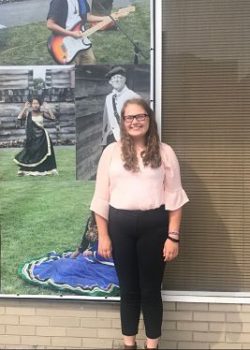
Submitted by Johanna Burke ’21, one of 30 students doing community-based research this summer as a Fellow in the Upstate Institute Summer Field School
This summer, I have had the pleasure of working with the Mohawk Valley Resource Center for Refugees (MVRCR), with their Office for New Americans. MVRCR is a non-profit organization that serves Utica’s refugee community, which makes up almost a quarter of Utica’s population. MVRCR is a resettlement agency, meaning that it arranges refugees’ travels to the U.S. and helps them settle in Utica, but their assistance does not stop there. MVRCR also has traffic safety, employment, translation, and interpretation departments, offers assistance with immigration issues, and offers many classes and workshops to the community, including ESOL classes. The Office for New Americans provides assistance in applying for naturalization, citizenship classes to prepare refugees for the naturalization exam, free legal consultation, and community workshops and trainings. MVRCR works to help refugees settle in Utica and build meaningful lives in their new homes.
Since 1981, MVRCR has helped resettle over 16,500 refugees from over 25 different countries. Refugees often come to America with very few resources and limited English language skills, and MVRCR works to help refugees become successful despite these barriers, and thus far, they have been incredibly successful in this mission. Refugees have revitalized the City of Utica by increasing the population, starting new businesses, stimulating the housing market, and so much more. Like most rust belt cities, Utica suffered a sharp population decline after the 1980s, but refugees are helping to bring this population back up. This population increase rejuvenates neighborhoods that had become desolate by bringing money back into the housing market and local economy. Refugees are also more likely than U.S. born citizens to start a business, which benefits the economy and creates jobs. Refugees have turned a declining city into a growing hub of diversity, but it is important to note that the heart of MVRCR’s mission is to help individuals who have been torn away from their homes to find a new home in Utica, and these economic outcomes are simply an added bonus.
Over the course of the summer, I have mainly worked with the Office for New Americans. In the Office for New Americans I have assisted with citizenship classes, community educational events, and community outreach. My main project has been to research the ways in which the citizenship class that MVRCR offers could be improved. In today’s political climate, it is especially important for refugees to apply for citizenship as soon as possible. However, the civics exam and interview requires applicants to have a basic understanding of how to read, write, and speak English, and also an understanding of the history of the United States and its government. Therefore, most of my research was centered around the best practices for teaching adults ESOL. The other interns and I also helped with preparing for World Refugee Day in the beginning of the summer, which was a large event on June 22nd that celebrated the refugees in Utica. We went all over Utica to hang up posters in different languages to advertise for the event, and it was interesting to explore the area and see the diverse businesses, restaurants, community centers and churches that are run and supported by Utica’s refugee community.
I eventually want to go into nonprofit work, and I knew that working as a Field School Fellow for the Upstate Institute this summer would be an excellent way to gain experience in that field and learn more about it. I am from Upstate New York, and I love that this program has given me the opportunity to use what I have learned from Colgate to give back to the community. As a political science major, there have been many policies that I had learned about in class that I have gotten to see the ground-level effects of from working at MVRCR, and that has been incredibly interesting. I think Colgate can sometimes be a bubble within Upstate New York, and the Upstate Institute does an excellent job of bridging the gap between Colgate and the outside community.

